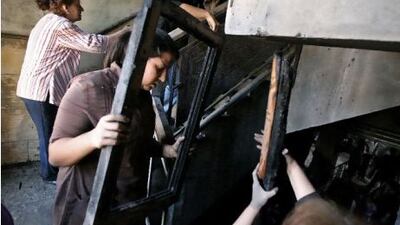CAIRO // The Egyptian government vowed to crack down on sectarian strife with "an iron hand" yesterday after clashes left at least 10 dead and hundreds injured.
Hundreds of soldiers and police ringed two burnt-out churches in Cairo after Saturday night's Muslim-Christian violence in Imbaba, a working-class neighbourhood with a history of sectarian tension.
The government's forceful response came amid rising concerns that a security vacuum in Egypt after the removal of the former president Hosni Mubarak has left its Christian minority vulnerable to assaults from Islamist extremists.
"After Mubarak it's been worse, because Mubarak was controlling the country and now no one is controlling it," said Raouf Shokry, an English teacher and local resident standing in the blackened, smoking interior of the Virgin Mary Church, where one person was reported killed by the fire.
"If the government can get the power to control this country they can hold it together, if they fail there will be no more Egypt," he said.
Petrol bombs thrown into the church had left the walls blackened. Ceiling fans, warped from the heat of the fire, hung from above like wilted flowers. "This church is part of me," said Rakha Khalil, a parishioner who stood crying quietly in front of the ruined altar.
The violence began at about 5pm when a crowd of what eye witnesses described as Salafite Muslims marched on St Menas Church brandishing clubs, knives and guns. They were incensed by a rumour that a female convert to Islam was being held in the church, and demanded to be let inside, according to MENA, the state news agency.
A group of Christian youths refused, and the resulting street battle raged for hours as both sides threw stones and traded gunfire. The mob threw firebombs at St Menas Church and damaged the exterior but were unable to get through the gate. Instead the crowd torched several Christian stores and an apartment building nearby. Ambulances and security forces took hours to arrive, witnesses said.
At about 10pm, a separate mob attacked the unguarded Virgin Mary Church, about 2km away, with Molotov cocktails. "In this area there are not a lot of Christians, so it was easier to burn," Mr Shokry said.
The violence left six Muslims and three Christians dead, and 186 people injured.
The religion of a tenth person found dead was not known.
Outside the Virgin Mary Church yesterday, soldiers looking to send a message of control fired their rifles into the air to disperse onlookers and prepared to enforce an impromptu 5pm curfew. Dozens of armoured personnel carriers rumbled into the neighbourhood to surround both churches, and the main thoroughfare near St Menas Church was emptied of cars and people.
Essam Sharaf, the prime minister, cancelled a planned trip to the Gulf and held an emergency cabinet meeting to discuss the sectarian violence. Emerging from the meeting, Abdelaziz el Gindi, the justice minister, said the government would "strike with an iron hand all those who seek to tamper with the nation's security", and would "immediately and firmly implement the laws that criminalise attacks against places of worship".
In the Christian community of Imbaba yesterday few had any trust in the government's promises.
The police and army "need to apply the law" but the government remains too weak to protect the Christians, said Father Hermina, the head priest at St Menas Church. The security vacuum is "maybe just temporary" until a new government is elected, he added.

